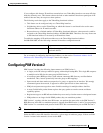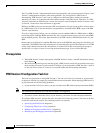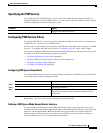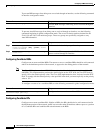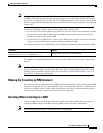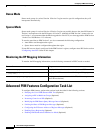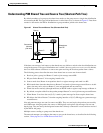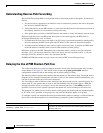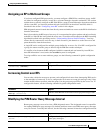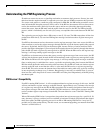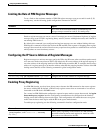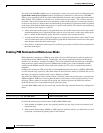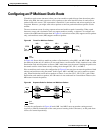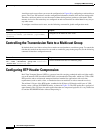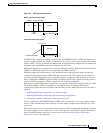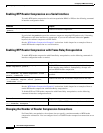
Configuring IP Multicast Routing
Advanced PIM Features Configuration Task List
IPC-425
Cisco IOS IP Configuration Guide
Assigning an RP to Multicast Groups
If you have configured PIM sparse mode, you must configure a PIM RP for a multicast group. An RP
can either be configured statically in each box, or learned through a dynamic mechanism. This section
explains how to statically configure an RP. If the RP for a group is learned through a dynamic mechanism
(such as Auto-RP), you need not perform this task for that RP. You should use Auto-RP, which is
described in the section “Configuring Auto-RP” earlier in this chapter.
PIM designated routers forward data from directly connected multicast sources to the RP for distribution
down the shared tree.
Data is forwarded to the RP in one of two ways. It is encapsulated in register packets and unicast directly
to the RP, or, if the RP has itself joined the source tree, it is multicast forwarded per the RPF forwarding
algorithm described in the preceding section, “Understanding Reverse Path Forwarding.” Last hop
routers directly connected to receivers may, at their discretion, join themselves to the source tree and
prune themselves from the shared tree.
A single RP can be configured for multiple groups defined by an access list. If no RP is configured for
a group, the router treats the group as dense using the PIM dense mode techniques.
If a conflict exists between the RP configured with this command and one learned by Auto-RP, the
Auto-RP information is used, unless the override keyword is configured.
To assign an RP to one or more multicast groups, use the following command in global configuration
mode:
Increasing Control over RPs
You can take a defensive measure to prevent a misconfigured leaf router from interrupting PIM service
to the remainder of a network. To do so, configure the local router to accept join messages only if they
contain the RP address specified, when the group is in the group range specified by the access list. To
configure this feature, use the following command in global configuration mode:
Modifying the PIM Router Query Message Interval
Router query messages are used to elect a PIM designated router. The designated router is responsible
for sending IGMP host query messages. By default, multicast routers send PIM router query messages
every 30 seconds. To modify this interval, use the following command in interface configuration mode:
Command Purpose
Router(config)# ip pim rp-address rp-address
[access-list] [override]
Assigns an RP to multicast groups.
Command Purpose
Router(config)# ip pim accept-rp {rp-address |
auto-rp} [access-list]
Controls which RPs the local router will accept join messages from.
Command Purpose
Router(config-if)# ip pim query-interval
seconds
Configures the frequency at which multicast routers send PIM
router query messages.



